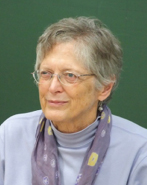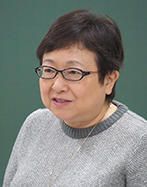 |
| Anne Walthal |
 |
| Masako Ishii-Kuntz |
 |
On Wednesday, December 16, 2015, an IGS seminar was held at Ochanomizu University featuring a lecture by Dr. Anne Walthall (Specially Appointed Professor, IGS) on the topic of “Good Older Brother, Bad Younger Brother: Gender Dynamics in an Early Modern Family.” Dr. Walthall is a historian who specializes in Japanese early modern history. She is currently professor emeritus at University of California, Irvine, where she worked for many years.
In her lecture, Walthall explained the disparity between brothers that was created by the patriarchal system of the samurai society, which forced the younger sons of the family to be subordinate to the father and the eldest son even after they attained adulthood and created their own independent households. To do so, she drew on an analysis of letters and other documents written by members of the family of Atsutane Hirata—including Kanetane, his son; the eldest son of Kanetane, Nobutane (a good older brother); and Kaneya, the second son (a bad younger brother). Walthall also discussed the methodology of historical studies, explaining that in the West, historical studies had been carried out on the assumption that human behavior was logical, but in recent years, greater attention is being paid to the role of emotions. In order to gain insight into the emotional aspects of history, the study of documents such as letters is very fruitful.
In the discussions that followed the lecture, it was suggested that the relationship between the brothers Nobutane and Kaneya could also have been strongly influenced by other factors, such as the historical background of the Bakumatsu era (the final years of the Edo period), the political situation in the Akita domain where the brothers resided, and the huge differences between the two men—the older brother had a reputation as being brilliant while the younger brother was seen as being a poor scholar but strong at martial arts. It was also pointed out that the practice of the first son taking all was observed in Japan until quite recently.
Many of the participants in the audience were family sociologists and they noted the similarity between the two research fields, as sociologists only started to discuss emotions about 20 years ago, just as historians did.

